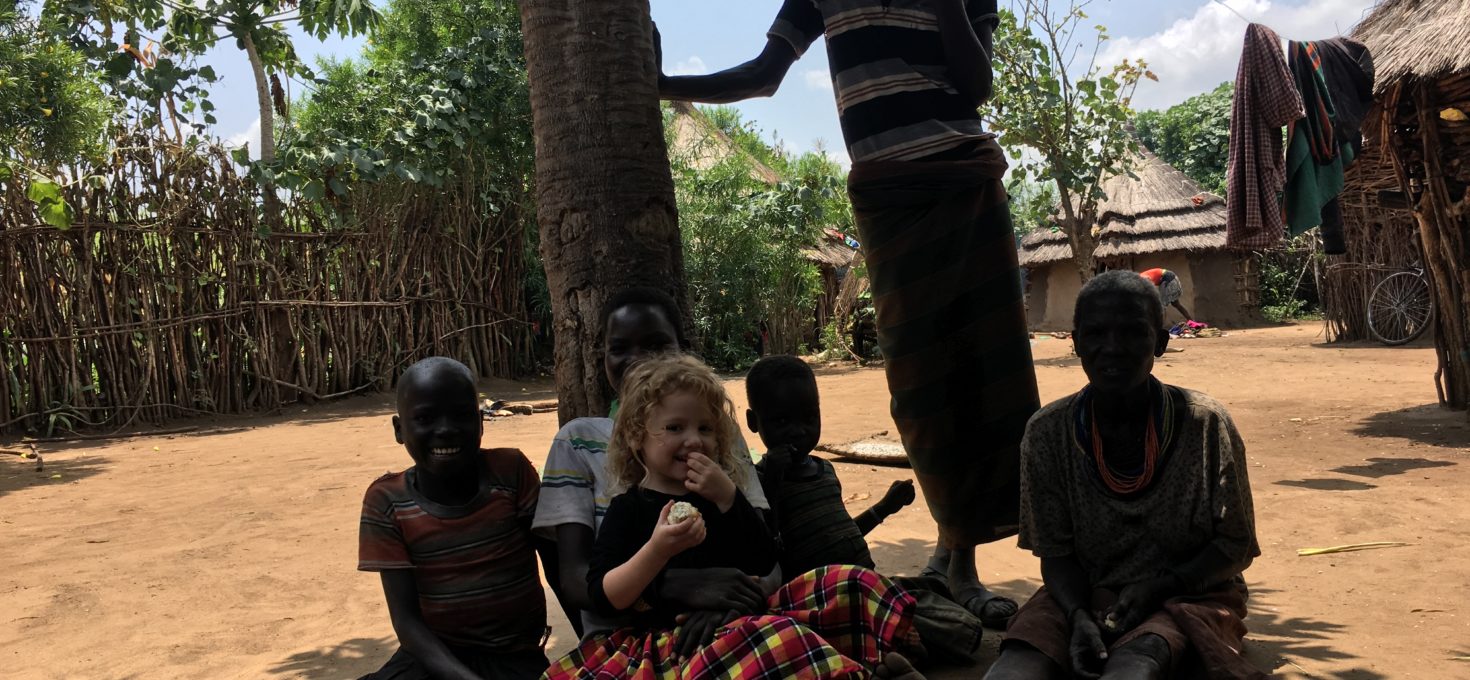I told Longole we would be coming home with her after work. She washes clothes for us twice a week. I invited myself, my kids and the kid of a neighbor I was watching. This is the way I’ve been told you make friends. You invite yourself to their home, so I did. She led us through the tall grass and even carried one of my children. She pointed to plants along the way telling me their names and she smiled broadly as Zion hugged her tightly thankful for the ride. I thought I knew where she lived, she had pointed in the direction enough times from my door. I found I did not actually know and would have been lost without her. Once in her yard, she settled us under a shade tree and laid out a flattened grain sack. We sat down thankful for the shade. She began to prepare some boiled potatoes with tomatoes and salt. There was a whole debate with her father on the right quantity of salt and whether we would also like maize and if it should be boiled or roasted. I tried to assure them we would be thankful for whatever they shared with us, and hoped my kids truly would be. Her father picked the maize from their garden just through the thorn fence. Carmel loves maize and eagerly followed him to procure the ears. There was a constant flow of people since they shared an open yard with another family who’s living was to sell sorghum beer. The customers, group of men sitting low on their stools, greeted us with jolly smiles and were generally glad to have us there. I tried to ask the names and relations of the revolving door of guests and I’m sure I got some of them mixed up. When finally the meal was ready, she brought water in a pitcher for us to wash our hands. We were the only ones eating. I had to coax some of the children to take some of the piping hot maize. We didn’t finish it all. They seemed surprised but not disappointed. It’s ok to say you’re satisfied here. Leftovers never go to waste; they don’t pine over whether or not you liked it. The morning was only completed when we took a blurry, dark picture of whoever could squish in. Longole walked us all the way home, once again carrying Zion and a gift of more maize for Christopher since he didn’t join us. Now I’ve reminded her that we’re friends, and we’re both happy.
I invited myself to the house of another person. I didn’t tell Loru we were coming. That was the idea. She has been struggling to care for her children, to even mind the house that is crumbling around them in the torrential rains. I can’t seem to understand what’s holding her back. No one does. I dashed out of the house one afternoon to meet a nurse from the clinic, one of her neighbors, a translator and our clinic chaplain who had agreed to accompany me. Dinner was mostly ready on the stovetop and we were racing dark rain clouds. The children stayed home with Christopher and I enjoyed the freedom of pace. We chatted and joked about the weather and what we would do if it really started to rain since even our destination didn’t offer protection. She wasn’t there when we arrived, but the neighbor had guessed she wouldn’t be and knew where to find her. She ambled in behind us. The compound was overgrown with towering weeds. Her house roof was leaking. There was a huge gap in her wall, and yet she refused to act to change her situation. While we talked and encouraged her to shift to a house nearby, begin preparing for a new home, to stop looking to others to solve her problems for her, to be thankful for what she has, that we were there first because of Christ’s love and secondly because of our love for her, to ask forgiveness from someone she had wronged, her two young girls ran circles around us giggling and creating mischief. There is grace in their games. She made no move to offer us anything, if there was anything to offer. She didn’t bring anything out for us to sit on, we crouched in the dirt, pulled up our own rocks, or perched on an old tire. She barely spoke and we didn’t commemorate the event with a picture.
I am often in awe of how people survive in the village. Their lives are filled with hard work, and sickness. They don’t have basics we take for granted like electricity and clean running water. But I have to check myself when I think that giving those things will make them happy or solve their problems. My egotistical view is not surprised at Loru’s apathy and suffering. It is Christ who is already present in Longole and her family. The contrast is not one made by material goods, but by grace at work. For us that have, we want to help those who don’t by giving, but a gift given without the enlivening of the Spirit can itself be poison. I plan to continue inviting myself to the village no matter the reception, with the comforting knowledge that Christ was at work before we arrived, He continues to work through and in spite of us, and He will continue to work long after we’re gone.
